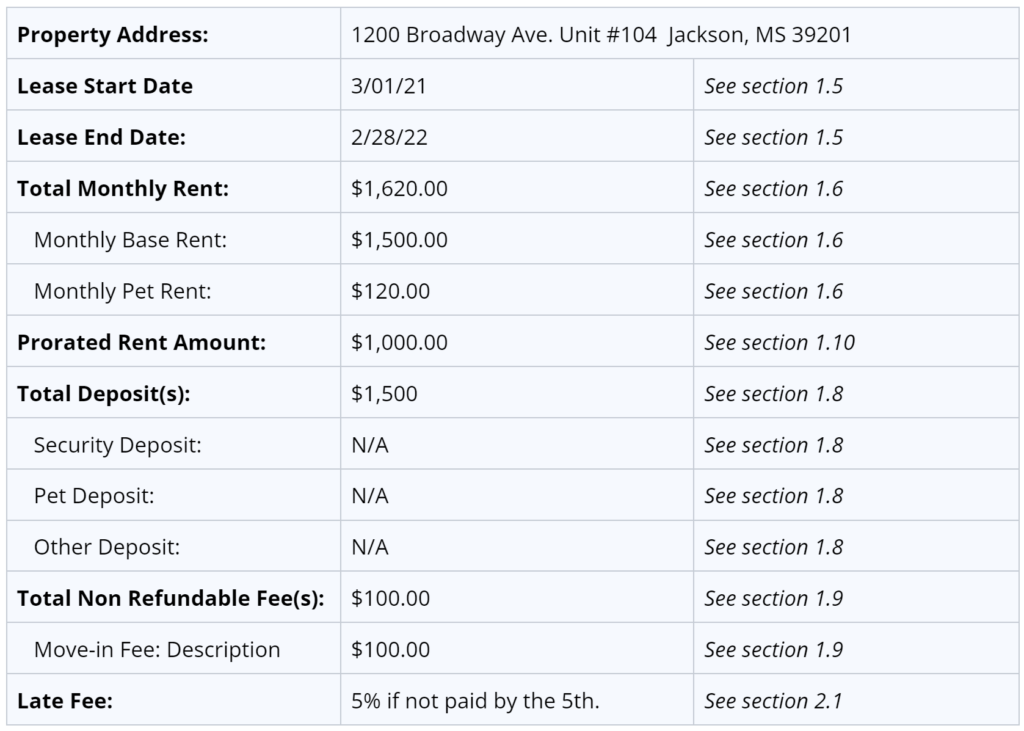Missouri landlord-tenant law allows the rental relationship to operate smoothly, guaranteeing both parties’ fair treatment. As a result, it’s crucial to understand the particulars of Missouri’s housing rules thoroughly.
To that end, TurboTenant is reviewing Missouri landlord and tenant rights, covering the specifics of the eviction process, security deposits, and much more.
Read on to learn about landlord-tenant relationships in the Show Me State.
Marketing. Applications. Leases. Payments.
Key Findings: Landlord-Tenant Rights & Responsibilities
Missouri landlords and tenants possess certain rights and responsibilities that govern every rental situation. We’ll review some of these crucial points here.
Missouri landlords have the right to:
- Charge an application fee
- Charge a security deposit
-
- Charge rent and late fees for delayed rent
- Enter the dwelling unit when necessary
- Evict tenants with good cause
Missouri landlords are responsible for:
-
- Providing safe, habitable housing to all tenants
- Maintaining property
- Making all mandatory disclosures
-
- Returning security deposit to tenants after move-out
- Adhering to the terms of the lease
Missouri tenants have the right to:
- Safe, habitable housing
-
- Privacy in their rental unit
- Withhold or deduct rent if a landlord fails to make repairs
- Contest eviction lawsuits
- Receive security deposit receipt and an itemized list of damages, if applicable
Missouri tenants are responsible for:
-
- Maintaining the property in good condition aside from normal wear and tear
- Allowing the landlord to enter the dwelling unit if necessary
- Paying rent in full and on time
-
- Obtaining the landlord’s permission to sublease the unit or take on additional occupants
- Adhering to the lease terms
Best Practices for Screening Prospective Tenants
Landlords should always screen potential renters to confirm their trustworthiness. To that end, Missouri landlord-tenant law allows landlords to charge a rental application fee in any amount deemed necessary.
As part of the screening process, landlords may inquire about tenants’ criminal and credit history. However, screening processes must apply equally to all potential tenants. The Federal Fair Credit Reporting Act (15 USC § 1681) also requires landlords to notify tenants if their credit score led to denial of housing.
For a hassle-free screening experience, try TurboTenant’s Tenant Screening features.
Compliance with Fair Housing Laws in Missouri
To avoid violating Missouri tenant rights, landlords must abide by both federal and state fair housing laws. These regulations allow tenants of all backgrounds to seek housing equally, despite factors like race, gender, or religion.
What actions are considered housing discrimination?
Landlords may commit housing discrimination by refusing to rent, charging higher rent, or misrepresenting rental availability to specific tenants. Discriminatory rental advertising — stating that individuals with disabilities should not apply, for example — also violates fair housing laws.
Additionally, landlords must screen all tenants equally and cannot use stricter screening processes for different applicants (Mo. Rev. Stat. § 213.040).
How can discrimination be avoided in rental practices?
To avoid discrimination, landlords should advertise, screen, and implement lease terms equally. Furthermore, landlords must be willing to make reasonable accommodations to allow individuals with disabilities to rent a dwelling unit (Mo. Rev. Stat. § 213.040 (2)).
Landlords must also train staff to avoid fair housing violations, as landlords will be held liable for their employees’ actions.
What are the repercussions for fair housing violations?
Victims of fair housing violations can call the Missouri tenant rights hotline to file a complaint of discrimination. Landlords who have violated fair housing practices may be subject to federal fines between $16,000 and $65,000. As a result, landlords who have been accused of these violations should document all evidence in their favor and promptly seek civil legal assistance.
Missouri Lease Agreements
Rental contracts between landlords and tenants may be oral or written in Missouri (Missouri’s Landlord-Tenant Law, pg. 8). However, a legally binding, written lease agreement will better clarify the terms of the rental agreement.
In Missouri, oral rental agreements only apply to month-to-month leases, which typically expire and renew at the end of every month. Fixed-term leases lasting a year or more require a written lease.
Which lease terms are legally required in Missouri?
Missouri landlord-tenant law does not require specific terms in rental contracts. However, the state government recommends including the landlord’s name, the rental property’s address, and information regarding rent payment.
What constitutes legal renting in Missouri?
Mo. Rev. Stat. § 441.060 requires landlords to allow two people to live in each bedroom, but exact occupancy limits may vary based on locality. If tenants wish to add more occupants or sublease, they must first obtain written permission from the landlord (Missouri’s Landlord-Tenant Law, pg. 10).
Landlords must also ensure that all rental properties are habitable and adhere to building and safety standards.
What tenant documentation is required?
Most landlords require applicants to provide a valid ID, proof of income, employment history, and references. Both landlords and tenants should make and maintain thorough records of all rental paperwork, which may be needed if disputes arise.
What are the mandatory landlord disclosures in Missouri?
Under the federal Lead-Based Paint Disclosure Rule, landlords must disclose the known presence of lead-based paint in any dwelling unit constructed before 1978.
Additionally, Missouri tenant rights require landlords to inform tenants of the known presence of radioactive or hazardous materials (Mo. Rev. Stat. § 442.055), if somebody used the property to manufacture methamphetamine (Mo. Rev. Stat. § 441.236), and the landlord’s name and address and that of any agents. (Mo. Rev. Stat. § 535.185)
Failure to disclose the presence of radioactive materials is a Class A misdemeanor. Other penalties for not making required disclosures may include fines and punitive damages.
Security Deposits in Missouri
Security deposits may cover a tenant’s unpaid rent or damages exceeding normal wear and tear. As such, landlords should always charge a security deposit to protect themselves and their properties.
What are the guidelines for security deposit collection?
A relatively new Missouri landlord-tenant law limits security deposits to the equivalent of two months’ rent (Mo. Rev. Stat. § 535.300 (1)). Though not required by law, landlords should provide a walk-through checklist detailing the property’s condition at move-in and move-out. This practice may prevent disputes over damages.
Missouri tenant rights also require landlords to hold the security deposit in a federally insured financial institution, though landlords don’t need to notify tenants of its location (Mo. Rev. Stat. § 535.300 (2)).
When can deductions be made from security deposits?
Landlords may use security deposits to cover unpaid rent and damages beyond normal wear and tear (Mo. Rev. Stat. § 535.300(4)). However, if a landlord removes funds from a security deposit, they must provide the tenant with an itemized statement of these deductions.
How should security deposits be returned?
Under Missouri tenant rights in 2024, landlords must return any unused portions of the security deposit and an itemized statement, if needed, to the tenant within 30 days after termination of the tenancy (Mo. Rev. Stat. § 535.300 (3)).
Maintenance Responsibilities of Landlords
Landlords in Missouri must maintain a safe, habitable dwelling unit that adheres to all building and safety codes. This includes making repairs to keep the property in good condition.
What are the legal standards for property conditions?
Missouri tenant rights stipulate that tenants are entitled to a dwelling unit that meets all health, safety, and building standards. While state law does not specify exact requirements, landlords generally must maintain functioning plumbing, heating, and electrical systems.
What is the proper protocol for repairs?
Tenants must file a repair request with their landlord. If the issue remains unresolved after 14 days, tenants may complete the repair and deduct the cost from their next rent payment. The cost must be less than either $300 or half of one month’s rent, and tenants must provide receipts to the landlord (Mo. Rev. Stat. § 441.234 (2)).
Should the landlord dispute the repair within the initial 14-day period, the tenant must obtain a written certificate from the local government stating that the repair is a code violation (Mo. Rev. Stat. § 441.234 (2)).
Tenants may also withhold rent for failure to make a repair materially affecting the unit’s safety and/or sanitation (King v. Moorehead, 495 S.W.2d 65 (Mo. Ct. App. 1973)).
Do landlords need to give tenants advance notice before accessing a rental property?
Missouri landlord-tenant law does not require landlords to notify tenants before entering a dwelling unit. However, most landlords provide 24 to 48 hours’ notice to avoid breaching a tenant’s right to privacy, which could lead to civil and financial penalties.
Late Rent Fee Regulations
Landlords in Missouri do not need to provide a grace period for tenants to pay rent (Mo. Rev. Stat. § 535.060). However, if rent becomes overdue, landlords may charge a reasonable late rent fee of $20 or 20% of the monthly rent, whichever is greater. Landlords may charge higher late fees if they can prove they’re reasonable under the circumstances.
Rent Control in Missouri
All forms of rent control are banned in Missouri (MRS § 441.043). However, if a landlord wishes to raise rent, they must wait until the end of the lease term and give a month’s notice to month-to-month tenants.
Lease Renewal and Termination
Landlords in Missouri are not required to renew expiring leases unless an automatic renewal clause exists in the rental agreement. Additionally, landlords and tenants do not have to notify one another if they do not wish to renew a lease — they can simply let it expire. (Missouri’s Landlord-Tenant Law, pg. 9)
Though tenants in Missouri typically must continue paying rent after breaking a lease, certain circumstances exempt them from doing so. Starting active duty military service (50 U.S.C.A. § 3955), utility shutoffs (Mo. Rev. Stat. § 441.233), and landlord harassment (King v. Moorehead, 495 S.W.2d 65 (Mo. Ct. App. 1973)) will allow Missouri tenants to break a lease legally.
Landlords may also terminate a lease early without penalty in certain circumstances, such as if the landlord is selling the property. In this case, notice must be given either 60 (year-to-year, Mo. Rev. Stat. § 441.050) or 30 (month-to-month, Mo. Rev. Stat. § 441.060) days in advance.
Eviction Procedures for Missouri Landlords
Eviction may seem straightforward, but the process varies between states. Thus, Missouri landlords must stay up-to-date on all details of the state’s eviction procedures.
What justifications exist for eviction?
Landlords may evict tenants for non-payment of rent, violating lease terms, or conducting illegal activity on the property. However, landlords can only evict tenants in Missouri with good cause.
What is the eviction process?
To evict a tenant, landlords must take the following steps:
- Landlords may immediately file for eviction due to unpaid rent (MRS § 535.010) or issue a 10-day notice to cure or quit for lease violations (MRS § 441.040).
- The landlord files an eviction lawsuit in Missouri Circuit Court (MRS § 534.060).
- The court serves the tenant with a summons.
- The Landlord and tenant attend a court hearing to receive judgment.
- The court issues a writ of restitution, allowing the sheriff to remove the tenant.
In the case of illegal activity or other emergencies, landlords may receive an immediate judgment for eviction (MRS § 441.740).
How is property reclaimed after eviction?
Landlords in Missouri can secure the dwelling unit after the tenant departs. If a tenant abandons personal property, the landlord must give notice 10 days before disposal (MRS § 441.065).
Local Ordinances for Landlords and Tenants
To learn more about Missouri landlord-tenant laws in 2024, visit the state legislature’s site. You can find additional ordinances specific to your area on Municode.
Federal Landlord-Tenant Laws
Beyond state and local regulations, federal landlord-tenant laws also affect rental situations in Missouri. Regulations like the Fair Credit Reporting Act, Title X, and the Fair Housing Act impact the rental relationship.
To learn more, visit the Office of Housing and Urban Development, the Consumer Financial Protection Bureau, and more.
Managing Tenant Legal Disputes as a Missouri Landlord
Though Missouri landlords should attempt to resolve landlord-tenant disputes themselves, the following resources can provide more assistance should legal proceedings become necessary:
- Legal Services of Eastern Missouri: Free civil legal services for low-income residents
- Missouri Legal Services: Legal aid programs to assist low-income and disadvantaged residents
- Legal Aid of Western Missouri: Free civil legal assistance in 40 counties
Navigate Your Landlord-Tenant Relationship with TurboTenant
If you need more assistance with Missouri landlord-tenant law or Missouri tenant rights, look no further than TurboTenant’s free property management software. You can streamline your rental process thanks to:
- Quick and easy-to-use rental applications
- Detailed tenant screening reports
- Lease agreement templates to create an airtight rental contract
- Rent collection software to track payments
- Rental advertising to fill vacancies
Sign up for a free TurboTenant account today to make the most of these and more features.
Disclaimer: TurboTenant does not provide legal advice. This material has been prepared for informational purposes only. All users are advised to check all applicable local, state, and federal laws and consult legal counsel should questions arise.
Missouri Landlord-Tenant Law FAQs
What are landlords required to provide by law?
Per Missouri landlord-tenant law, landlords must provide safe, habitable housing that upholds all health, safety, and building regulations. Additional amenities, such as heating and plumbing, may not be required but are expected based on local markets.
What is the proper notice period for lease termination?
Landlords must notify tenants 10 to 60 days before terminating a lease. In certain urgent cases, immediate lease termination may occur.
What maintenance rights do tenants have?
Tenants in Missouri have the right to request repairs from landlords. Should landlords fail to comply, tenants may exercise the right to deduct or withhold rent until the repair is completed.
How should utilities be handled in rental agreements?
Tenants in Missouri typically pay for utilities such as gas, electricity, and water. The lease should always outline this responsibility. Conflicts over utilities may be resolved in civil court or directly with the utility companies.
What are the eviction rules for tenants without a lease?
Certain Missouri tenant rights still apply to tenants without leases, who must receive the same eviction processes as tenants with leases.
How are guests and tenants legally differentiated?
Guests may visit a property for short periods without paying rent or adhering to the lease terms. Tenants, meanwhile, are permanent residents who must pay rent and abide by the lease. Should a guest stay longer than 14 consecutive days, they will become a tenant and receive Missouri tenant rights.




